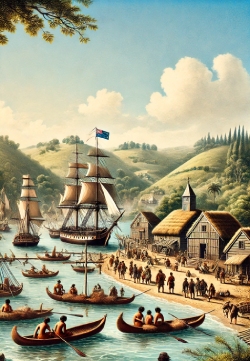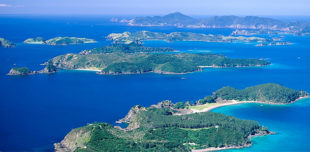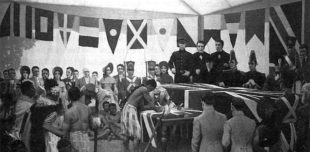A New Nation

Law and order in the Russell, Bay of Islands during the 1830's was pretty much non-existent despite the missionaries' best efforts. Even the British Resident (a kind of consul) appointed to Waitangi in 1833 had so little power that Māori named him the "man of war without guns ". Responsible residents at Kororāreka, European and Māori, decided to petition the British King William IV asking for the benefit of British protection. The reluctant British eventually agreed and declared New Zealand a British possession and it was in Kororāreka's little Christ Church that New Zealand's new first governor, Captain Hobson, officially announced the proclamation.
Declaring New Zealand a colony couldn't be done without the agreement of Māori, still by far the majority population - so on 6th February 1840 a treaty between Māori and the Crown was signed at Waitangi, across the bay from Kororāreka. Although still the subject of debate, the Treaty of Waitangi is the founding document of New Zealand as a nation.
The new colony now needed a capital. Kororāreka's unsavoury reputation put it out of the running so instead the capital of New Zealand was established a mile up harbour at Okiato and called Russell, after Lord John Russell, Secretary of State for the Colonies. But even Okiato's time as capital was short: Auckland by then was growing rapidly so in 1841 the capital was moved there. The name Russell eventually came to include Kororāreka as well and over time it stuck while Okiato later reverted to its original name.
Much of the shipping that used to come to the bay now started going to Auckland instead. Harbour duties were imposed. Early land sales were investigated for authenticity, so land values fell. Local Māori who had been doing nicely out of trade were hit by the economic downturn and loss of power and authority. Discontent was rumbling.


